(And the nominees are . . .)
This is new: one of the movies I listed as
among the worst five I saw all year (fifth-worst, to be exact), also happens to be the leader in this year's number of Academy Award nominations, at 13:
The Shape of Water, also known (by me) as
Elisa Fucks a Fish. Mind you, I have always conceded that I am in the minority on this one, a rare instance in which a widely critically acclaimed movie was one I just could not quite abide. The movie has many redeeming values; in my view, the fact that it features a woman who fucks a fish -- okay, "Amphibian Man" if you want to get technical; but is that
better? -- negates them.
Second-highest number of nominations goes to
Dunkirk, most of them in technical categories, which is no surprise; third goes to the movie with the most surprising momentum on the awards circuit,
Three Billboards Outside Ebbing, Missouri. The latter film is also suffering a backlash that is arguably half-deserved; I won't stand alongside those who insist it's an inexcusably
bad movie, but I will agree that it is deeply imperfect, and though deniably entertaining, really does not deserve the awards it has been getting -- and it is likely to win at least two of the acting awards, if the SAG Awards were any indication. And they usually are, although certainly not as any guarantee: they have only matched
all four acting Oscar winners
six times, and far more often match three out of the four. So, for a multitude of reasons, this year's Academy Awards are unusually unpredictable -- which can only be good for it, making it more interesting and more fun.
Actor in a Leading Role
Timothée Chalamet,
Call Me By Your Name
Daniel Day-Lewis,
Phantom Thread
Daniel Kaluuya,
Get Out
Gary Oldman,
Darkest Hour
Denzel Washington,
Roman J. Israel, Esq.
WHO I THINK WILL WIN: After winning countless critic circle awards, the Golden Globe,
and the SAG Award, in this category, Gary Oldman is the one to beat, and this is easily the most predictable win in an otherwise unusually unpredictable year.
WHO I THINK SHOULD WIN: This is a thorny one, this year in particular. Gary Oldman's evidently
shady place in the #MeToo movement makes me weary of advocating for him. I think the question of separating the artist from his art is a worthy one, but maybe not quite as much as usual this year. The thing is, among these nominees -- all of them great -- Gary Oldman's
is the strongest performance. But if I were a voting member, I'd probably cast my vote for Daniel Kaluuya.
WHO I THINK SHOULD
NOT WIN: This year, that would be Denzel Washington. No disrespect to him as an undeniably great actor, but nothing about
Roman J. Israel, Esq., which was good but not great, justifies an Academy Award.
Actress in a Leading Role
Sally Hawkins,
The Shape of Water aka
Elisa Fucks a Fish
Frances McDormand,
Three Billboards outside Ebbing, Missouri
Margot Robbie,
I, Tonya
Saoirse Ronan,
Lady Bird
Meryl Streep,
The Post
WHO I THINK WILL WIN: The big question for me here will be whether the surprising momentum for
Three Billboards Outside Ebbing, Missouri extends to the vast array of Academy Voters. It might not, but in all likelihood, it will. Just like Gary Oldman, after winning both the Golden Globe and the SAG Award (and there is massive crossover between Screen Actors Guild and Academy voters, making the acting awards the easiest to predict), the edge still goes to Frances McDormand. It's almost too bad -- her one win thus far, for
Fargo, was well deserved; I'm not convinced this one would be, particularly compared to her many other far stronger roles.
WHO I THINK SHOULD WIN: She doesn't have a snowball's chance in hell, but Margo Robbie keeps getting nominated and then not winning, and her performance is nothing short of amazing in
I, Tonya.
WHO I THINK SHOULD
NOT WIN: I'm tempted to say Frances McDormand here, but even she deserves it more, at this point in time, than Meryl Streep. Streep is indeed great in
The Post, and I am on board with it garnering her yet another increase in her record number of nominations. But, come on. The woman has three Oscars already -- spread the wealth around a little.
The Post would have to have been a far better film (even though it
is good) to justify giving her the award.
Actor in a Supporting Role
Willem Dafoe,
The Florida Project
Woody Harrelson,
Three Billboards outside Ebbing, Missouri
Richard Jenkins,
The Shape of Water aka
Elisa Fucks a Fish
Christopher Plummer,
All the Money in the World
Sam Rockwell,
Three Billboards outside Ebbing, Missouri
WHO I THINK WILL WIN: Until very recently, Willem Dafoe was the widely accepted frontrunner here. Then he lost the Golden Globe to Sam Rockwell, and it was like, well -- the Golden Globes are sort of the Fake Awards, with a voting block of less than 100, none of them crossing over with either SAG-AFTRA or the Academy. So there was no reason to think of it as a predictor of the SAG Award winner -- and then, Sam Rockwell won that one too. I would not say his chances are quite as etched in stone as those of Gary Oldman or Frances McDormand, but Sam Rockwell would still be in the lead here.
WHO I THINK SHOULD WIN: Again with the "not a snowball's chance in hell," after careful consideration, I have decided Christopher Plummer deserves this award. What he managed, in all of one week's worth of reshoots after
All the Money in the World rightfully dumped Kevin Spacey, is nothing short of astonishing. And for some reason, in spite of the massive press the reshoots got, not very many people went to see this movie. And they should have.
WHO I THINK SHOULD
NOT WIN: I liked
The Florida Project a lot, but didn't quite see Willem Dafoe's performance as the career highlight so many others seemed to. Even Sam Rockwell, a great actor in a deeply flawed movie, is more deserving, and I would argue against him winning for this movie as well.
Actress in a Supporting Role
Mary J. Blige,
Mudbound
Allison Janney,
I, Tonya
Lesley Manville,
Phantom Thread
Laurie Metcalf,
Lady Bird
Octavia Spencer,
The Shape of Water aka
Elisa Fucks a Fish
WHO I THINK WILL WIN: And here we get the third predictable actor win! With both a Golden Globe and the SAG Award, if Allison Janney
doesn't win for
I, Tonya -- easily the only Oscar that movie has any chance of winning this year -- it will be the biggest shock of the evening.
WHO I THINK SHOULD WIN: I'm on the fence between Allison Janney and Laurie Metcalf. I'd be thrilled for either of them, but Laurie Metcalf doesn't play the campaigning game, which, unfortunately, really does hurt her chances. She's just been along for the ride on the awards circuit, happily clapping for the other people who are winning in her category.
WHO I THINK SHOULD
NOT WIN: I do love Octavia Spencer. Who doesn't? But she doesn't need an Oscar for a role in which she talks casually about the penis of an amphibian-man with the woman who fucked him. I'm sorry, she just doesn't!
Animated Feature Film
The Boss Baby
The Breadwinner
Coco
Ferdinand
Loving Vincent
WHO I THINK WILL WIN: I do think Pixar Animation Studios will win the day in this category as usual this year, and nab the award for
Coco.
WHO I THINK SHOULD WIN: And
Coco, a deeply moving and visually beautiful animated film, will deserve it.
WHO I THINK SHOULD
NOT WIN: The animation in
Loving Vincent is indeed impressive -- but it's the only impressive thing about an otherwise incoherent movie.
Cinematography
Blade Runner 2049, Roger A. Deakins
Darkest Hour, Bruno Delbonnel
Dunkirk, Hoyte van Hoytema
Mudbound, Rachel Morrison
The Shape of Water aka Elisa Fucks a Fish, Dan Laustsen
WHO I THINK WILL WIN:
Dunkirk is such a technically flawless movie, this is where I think its likely multiple wins will begin.
WHO I THINK SHOULD WIN:
Blade Runner 2049 is the only movie among these nominees for which I graded the cinematography as high as a A-. It really is the most visually impactful of these films.
WHO I THINK SHOULD
NOT WIN: The cinematography in
The Shape of Water (aka
Elisa Fucks a Fish) was . . . fine. Have I mentioned I don't really get the excessive love for this movie?
Production Design
Beauty and the Beast
Blade Runner 2049
Darkest Hour
Dunkirk
The Shape of Water aka Elisa Fucks a Fish
WHO I THINK WILL WIN: I have a feeling
The Shape of Water (aka
Elisa Fucks a Fish) might actually win this one, it's so visually stylized, combined with its widespread love just generally speaking.
WHO I THINK SHOULD WIN: And that widespread love is missing from
Blade Runner 2049, which really is the most impressive among these nominees. It even deserves this award more than it deserves Best Visual Effects -- the effects in the original
Blade Runner were truly ahead of their time, and those of its sequel are not. But the production design still presents an impressively well-lived-in universe, if a bit unrealistically unevolved in the advanced thirty years of its setting.
WHO I THINK SHOULD
NOT WIN: Of all the impressive challenges met by
Dunkirk, production design is hardly the first one to come to mind.
Costume Design
Beauty and the Beast, Jacqueline Durran
Darkest Hour, Jacqueline Durran
Phantom Thread, Mark Bridges
The Shape of Water aka Elisa Fucks a Fish, Luis Sequeira
Victoria & Abdul, Consolata Boyle
WHO I THINK WILL WIN: If enough people actually see the movie, this might be the one Oscar
Phantom Thread actually wins. It's about a fashion designer, after all, and the many dresses and gowns featured are exquisite.
WHO I THINK SHOULD WIN:
Phantom Thread, for the reason mentioned above.
WHO I THINK SHOULD
NOT WIN:
Beauty and the Beast was actually a delightful surprise of a movie, but I can't say its costuming, while wholly appropriate, exceeded expectations.
Directing
Christopher Nolan,
Dunkirk
Jordan Peele,
Get Out
Greta Gerwig,
Lady Bird
Paul Thomas Anderson,
Phantom Thread
Guillermo del Toro,
The Shape of Water aka
Elisa Fucks a Fish
WHO I THINK WILL WIN: Given his film's 13 nominations, and the fact that
Three Billboards' Martin McDonagh was actually shut out of this category, Guillermo del Toro is the clear frontrunner here.
WHO I THINK SHOULD WIN: Among these nominees, Jordan Peele. None of the other films listed here were as timely, or as intricately layered with deep meaning, heart, horror and humor, as
Get Out was. He's not going to win, but he should.
WHO I THINK SHOULD
NOT WIN: Say it with me! "
The Shape of Water, aka
Elisa Fucks a Fish!" That's the one that's going to win, though.
Film Editing
Baby Driver, Paul Machliss and Jonathan Amos
Dunkirk, Lee Smith
I, Tonya, Tatiana S. Riegel
The Shape of Water aka Elisa Fucks a Fish, Sidney Wolinsky
Three Billboards outside Ebbing, Missouri, Jon Gregory
WHO I THINK WILL WIN: Another technical category likely to go to
Dunkirk, which is put together with intricate precision. It also curiously lacks a certain amount of humanity, leaving it feeling somewhat oddly sterile, but it still pulsates with urgency -- and nothing can take more credit for that than the film's editing.
WHO I THINK SHOULD WIN: Of these nominees, I actually was the most impressed with the editing in
I, Tonya, which superbly conveys the story from multiple viewpoints, sometimes contradicting each other, but always coherent.
WHO I THINK SHOULD
NOT WIN: Considering
Three Billboards Outside Ebbing, Missouri weirdly omits nearly all the minority characters meant to be vital to the plot, I'm mystified that movie even got nominated in this category.
Makeup and Hairstyling
Darkest Hour
Victoria & Abdul
Wonder
WHO I THINK WILL WIN: This one's easy:
Darkest Hour, in which Gary Oldman is quite impressively transformed into Winston Churchill, who he actually looks nothing like.
WHO I THINK SHOULD WIN: A win for
Darkest Hour, among these three nominees, would be deserved.
WHO I THINK SHOULD
NOT WIN: I never even saw
Wonder, but the deformity of that kid's face, even judging from trailers alone, could never stand up against the makeup job done on Gary Oldman.
Music (Original Score)
Dunkirk, Hans Zimmer
Phantom Thread, Jenny Greenwood
The Shape of Water aka Elisa Fucks a Fish, Alexandre Desplat
Star Wars: The Last Jedi, John Williams
Three Billboards outside Ebbing, Missouri, Carter Burwell
WHO I THINK WILL WIN: People love
The Shape of water (aka
Elisa Fucks a Fish) so much, they'll probably throw an Academy bone to it here.
WHO I THINK SHOULD WIN: You know what? I don't actually care.
WHO I THINK SHOULD
NOT WIN: Of all the awards
Three Billboards Outside Ebbing, Missouri does
not deserve, this would be the dumbest one to give it.
Music (Original Song)
"
Mighty River," from
Mudbound, Music and Lyric by Mary J. Blige, Raphael Saadiq and Taura Stinson
"
Mystery Of Love," from
Call Me By Your Name, Music and Lyric by Sufjan Stevens
"
Remember Me," from
Coco, Music and Lyric by Kristen Anderson-Lopez and Robert Lopez
"
Stand Up For Something," from
Marshall, Music by Diane Warren; Lyric by Lonnie R. Lynn and Diane Warren
"
This Is Me," from
The Greatest Showman, Music and Lyric by Benj Pasek and Justin Paul
WHO I THINK WILL WIN: This is a really tough one to call, although it's not uncommon for the signature song of a widely beloved Pixar movie to win in this category, which may give "Remember Me" the edge.
WHO I THINK SHOULD WIN: The Sufjan Stevens songs in
Call Me By Your Name are as comforting and cozy as the film itself -- this is the one that gets my vote, from the best movie of the year.
WHO I THINK SHOULD
NOT WIN:
The Greatest Showman was 2017's paean to great efforts leading to towering mediocrity, which is as much reflected in its music as anywhere else in the movie.
Visual Effects
Blade Runner 2049
Guardians of the Galaxy Vol. 2
Kong: Skull Island
Star Wars: The Last Jedi
War for the Planet of the Apes
WHO I THINK WILL WIN: Perhaps this will be the single Oscar won by
The Last Jedi.
WHO I THINK SHOULD WIN: None of these films was especially inventive when it came to visual effects, but I suppose
The Last Jedi actually came closest -- it certainly did the best at turning its effects into art.
WHO I THINK SHOULD
NOT WIN: As much as it pains me to say it -- because I liked it way more than either
Kong: Skull Island or
War for the Planet of the Apes --
Blade Runner 2049 is the least deserving in this specific category, especially considering how it failed to live up to the promise of its predecessor, one of the most visually influential movies of all time. It's a truly compelling movie ripe for discussions about the very definition of what it means to be human -- as was the original
Blade Runner -- but the effects here spend too much time attempting to re-create a world rather than trying to move it forward. I never saw
Guardians of the Galaxy, but I gave higher grades to the special effects in all three of the other movies in this category.
Writing (Adapted Screenplay)
Call Me By Your Name Screenplay by James Ivory
The Disaster Artist, Screenplay by Scott Neustadter & Michael H. Weber
Logan, Screenplay by Scott Frank & James Mangold and Michael Green; Story by James Mangold
Molly's Game, Written for the screen by Aaron Sorkin
Mudbound, Screenplay by Virgil Williams and Dee Rees
WHO I THINK WILL WIN: After being narrowed down to these five contenders, I think Adapted Screenplay may very well be the one Oscar
Call Me By Your Name actually wins. If not that, then it will be
Mudbound. The other three films just don't have enough going for them otherwise.
WHO I THINK SHOULD WIN:
Call Me By Your Name, hands down -- an easy answer for me since it was the best film of the year.
WHO I THINK SHOULD
NOT WIN: I'm kind of astonished
Molly's Game, with its relentless and oppressive voice-over narration, even got nominated. I guess just being Aaron Sorkin has its many conveniences.
Writing (Original Screenplay)
The Big Sick, Written by Emily V. Gordon & Kumail Nanjiani
Get Out, Written by Jordan Peele
Lady Bird, Written by Greta Gerwig
The Shape of Water aka Elisa Fucks a Fish, Screenplay by Guillermo del Toro & Vanessa Taylor; Story by Guillermo del Toro
Three Billboards Outside Ebbing, Missouri, Written by Martin McDonagh
WHO I THINK WILL WIN: Given its miniscule chances elsewhere,
Get Out might actually have the edge here.
WHO I THINK SHOULD WIN: I would be truly happy for Jordan Peele to win for
Get Out, but this is the single nomination for
The Big Sick, which I felt was the
second-best movie of the year. Give that movie an award, already! It's wonderful all around, but its utterly unique and delightful script is easily the best thing about it.
WHO I THINK SHOULD
NOT WIN: The more I see
Three Billboards Outside Ebbing, Missouri getting nominated for awards it does not deserve, the more I resent it. It deserves an award for screenwriting least of all -- it has great performances by actors who elevate its
flawed material.
Best motion picture of the year
Call Me By Your Name
Darkest Hour
Dunkirk
Get Out
Lady Bird
Phantom Thread
The Post
The Shape of Water aka Elisa Fucks a Fish
Three Billboards outside Ebbing, Missouri
WHO I THINK WILL WIN: Given the recent surge in momentum, I was thinking
Three Billboards Outside Ebbing, Missouri might actually wind up with the Best Picture award. But, upon further reflection, I think it will merely have to settle with acting awards. Thirteen nominations is a lot, and that definitely gives the edge to
The Shape of Water. Which means, as I have made abundantly clear, this year's likely winner for Best Picture is a movie about a woman who fucks a fish. Okay, okay, "Amphibian Man"!
WHO I THINK SHOULD WIN:
Call Me By Your Name. Duh. Do yourself a favor and watch this movie. And then watch it again.
WHO I THINK SHOULD
NOT WIN: My acknowledgment of the many flaws of
Three Billboards Outside Ebbing, Missouri notwithstanding, I really,
really do not want a movie about a woman who fucks a fish to win Best Picture. But, it probably will.
(Nominations for foreign language film, documentary feature, documentary short, animated short, live action short, sound editing, and sound mixing were also announced, but I don't know enough about them to make any worthwhile observations.)
The 90th Academy Awards telecast will air on ABC Sunday, March 4 at 4 p.m. Pacific Time. .
 DeKalb Elementary (USA, 21 minutes) is an impressively tense short film for how spare it is in production design: a possible school shooter walks in with a gun, and all we ever see for all 21 minutes of the run time is the reception area where the young man spends his time. We never know whether he might actually shoot someone, but soon learn he has mental issues an is off his meds, and the entirely black staff, particularly an unlucky woman covering reception just for the day, helps talk him down. All of the action takes place exclusively in this one room, but the characters each effectively evoke their individual worlds outside of it.
DeKalb Elementary (USA, 21 minutes) is an impressively tense short film for how spare it is in production design: a possible school shooter walks in with a gun, and all we ever see for all 21 minutes of the run time is the reception area where the young man spends his time. We never know whether he might actually shoot someone, but soon learn he has mental issues an is off his meds, and the entirely black staff, particularly an unlucky woman covering reception just for the day, helps talk him down. All of the action takes place exclusively in this one room, but the characters each effectively evoke their individual worlds outside of it.
 What The Silent Child (UK, 20 minutes) lacks in resolution, it makes up for in messaging: this is about a little deaf girl whose parents don't quite understand the importance of teaching her sign language, and the young teacher who tries in vain to explain it to them. We learn at the end of this filn that while 90% of deaf children are born to hearing parents, 78% of deaf children attend hearing schools. This film has little chance of winning the Oscar, given the racially charged political climate tipping the odds in favor of the several shorts that address racial issues, but for this one, the win is truly just in getting nominated -- exposure to these issues is the key. This is the first of four shorts out of those nominated that shows footage of the cast and crew learning of their nomination. This one is well deserved, and in all cases it's fun and touching to see the filmmakers so excited.
What The Silent Child (UK, 20 minutes) lacks in resolution, it makes up for in messaging: this is about a little deaf girl whose parents don't quite understand the importance of teaching her sign language, and the young teacher who tries in vain to explain it to them. We learn at the end of this filn that while 90% of deaf children are born to hearing parents, 78% of deaf children attend hearing schools. This film has little chance of winning the Oscar, given the racially charged political climate tipping the odds in favor of the several shorts that address racial issues, but for this one, the win is truly just in getting nominated -- exposure to these issues is the key. This is the first of four shorts out of those nominated that shows footage of the cast and crew learning of their nomination. This one is well deserved, and in all cases it's fun and touching to see the filmmakers so excited.
 My Nephew Emmett (USA, 20 minutes) features a very slow and deliberate pace, and eases us into the realization that it's based on the true story of Emmett Till, a young black man murdered in Mississippi or simply whistling at a white woman. His 64-year-old uncle tries, ultimately in vain, to protect this boy visiting from Chicago where social mores are a little different. Soon enough to white man arrive at the house, armed, leaving the residents of the home powereless to stop them from taking the young man away. Needless to say, this one is a bit of a downer in the end, but it's no less powerful for it, and is the strongest short film among these five. It would get my vote for the Oscar.
My Nephew Emmett (USA, 20 minutes) features a very slow and deliberate pace, and eases us into the realization that it's based on the true story of Emmett Till, a young black man murdered in Mississippi or simply whistling at a white woman. His 64-year-old uncle tries, ultimately in vain, to protect this boy visiting from Chicago where social mores are a little different. Soon enough to white man arrive at the house, armed, leaving the residents of the home powereless to stop them from taking the young man away. Needless to say, this one is a bit of a downer in the end, but it's no less powerful for it, and is the strongest short film among these five. It would get my vote for the Oscar.
 Every year there has to be at least one live action short that is more light-hearted and fun, lest the whole bunch of them lure us al into a deep depression. The Eleven O'Clock (Australia, 13 minutes) is this year's example, a comic story of a psychiatrist seeing a patient who is convinced he is himself a pyschiatrist. It quickly becomes clear that we, the viewer, do not know exactly who truly is the psychiatrist and who is the patient. The inevitable twist at the end could not be more predictable, but the film is still a worthy bit of a good time.
Every year there has to be at least one live action short that is more light-hearted and fun, lest the whole bunch of them lure us al into a deep depression. The Eleven O'Clock (Australia, 13 minutes) is this year's example, a comic story of a psychiatrist seeing a patient who is convinced he is himself a pyschiatrist. It quickly becomes clear that we, the viewer, do not know exactly who truly is the psychiatrist and who is the patient. The inevitable twist at the end could not be more predictable, but the film is still a worthy bit of a good time.









 10. The Landing A-
10. The Landing A-
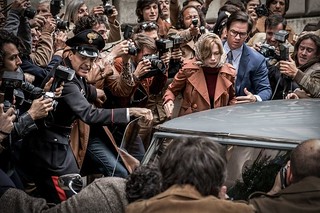 9. All the Money in the World A-
9. All the Money in the World A-
 8. Saturday Church A-
8. Saturday Church A-
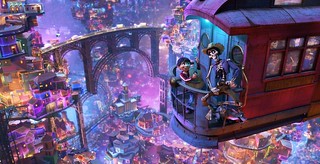 7. Coco A-
7. Coco A-
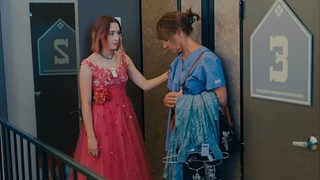 6. Lady Bird A-
6. Lady Bird A-
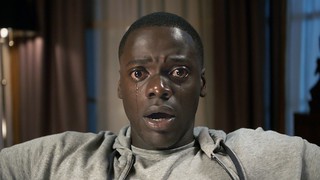 5. Get Out A-
5. Get Out A-
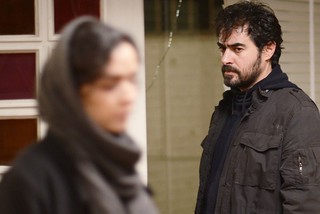 4. The Salesman A
4. The Salesman A
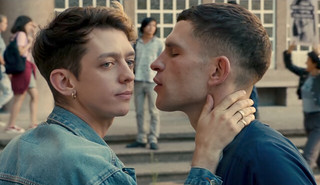 3. BPM (Beats Per Minute) A
3. BPM (Beats Per Minute) A
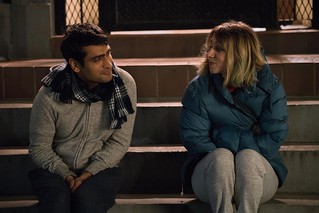 2. The Big Sick A
2. The Big Sick A
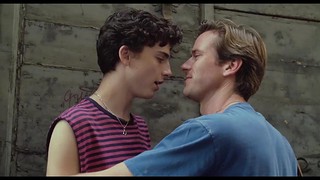 1. Call Me By Your Name A
1. Call Me By Your Name A
 5. The Shape of Water C+
5. The Shape of Water C+
 4. Valerian and the City of a Thousand Planets C+
4. Valerian and the City of a Thousand Planets C+
 3. Life C
3. Life C
 2. mother! C-
2. mother! C-
 1. Geostorm D+
1. Geostorm D+